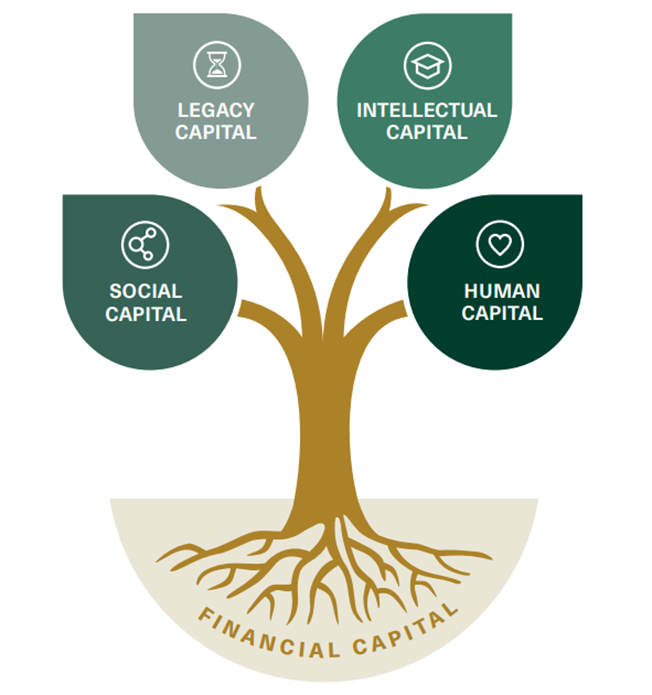- Jay Hughes believes families should exist to enhance the lives of their members.
- Redefining wealth to the original definition of well-being, Jay defines 5 key capitals: human, intellectual, social, legacy and financial.
- Families that seek to flourish across generations must create cultures of affinity and harness and grow the 5 capitals.
James “Jay” E. Hughes has dedicated his career to uncovering how families with significant financial capital leverage all their resources to build a family that flourishes across multiple generations. His quest to answer that question — and then help families apply that knowledge — has taken him around the world, from boardrooms in Singapore to caves in South Africa.
Along the way, Jay has authored multiple books on the topic, including 1997’s Family Wealth: Keeping It in the Family, which radically changed the mindset of many families and advisors and redefined their approach to wealth, legacy and the impact of money on future generations. Complete Family Wealth1 was also published twenty years later as a successor volume to incorporate further learnings about generational wealth, shared decision-making and purpose. Jay has also advised multiple firms, institutions, think tanks and, of course, families. His research proves the importance of strong family relationships in preserving wealth, and how those relationships can focus on growing intangible capitals of wealth to empower generations of family members to flourish.
We talked with Jay about his industry-changing approach, his work regarding the five capitals of wealth and what it takes to create a “family of affinity,” which is a family that strives to remain together and improve the well-being of each member. The highlights of our conversation provide invaluable insights to any family interested in thriving for decades to come.
You revolutionized the field of wealth management with your purposeful approach to helping families navigate wealth. How has your own thinking evolved since you first introduced the concept of a holistic approach to navigating wealth?
I’ve been practicing law for almost 54 years. The first 25 or so, I spent doing what lawyers do, which is provide knowledge. The second half of my career, I realize, has been spent providing courage. That’s because a family needs courage to really imagine itself 100 or 150 years from now, which is how long it takes the third generation to be born and die. There really isn’t any knowledge that would be useful because over 150 years, things change and evolve so rapidly. So the core question for the moment is does a family have the courage to try? I didn’t understand that at the beginning of my career. So that’s something I’ve learned.
The second thing I’ve changed my thinking on is the word wealth. I fought against it because I didn’t think its financial definition was where wealth actually was in a family. I thought financial wealth simply supported a family’s journey. Then one day I discovered that the word wealth is a derivation of well-being. I just didn’t understand the breadth of the term. And now I’m living with that wonder that wealth means well-being.
Your wealth management framework cites the importance of growth in five capitals — human, intellectual, social, legacy and financial — as essential to well-being. For those new to this concept, how do you describe the five capitals and the role they play for families in planning?

I would start by saying that the reason a family exists is to enhance the lives of its members. When every member is flourishing, the whole system is working. That speaks to purpose and ultimately the first capital — legacy. You’re aspiring to a family that’s going to last for 150 years (or more). The second capital is social or the core practice of the family. Can you make decisions together? When you think about a 150-year journey or 100-year journey, or even a six-week journey, what you find is that you have to be making joint decisions.
The third consideration is intellectual capital. What do you know? What are you learning? Is your system constantly learning? And then comes the key: Are you sharing what you learn? The fourth capital is human capital. Is every single member of your family flourishing? Is each of their dreams known to you? And are you seeking to bring each of their dreams to life? And then finally we have financial capital. So what’s the role of financial capital in supporting and growing those other four qualitative capitals? It is the growth of the four qualitative capitals that determines your fate. Families that align their financial capital in service to growing those four qualitative capitals become families of affinity.
The notion of legacy capital reminds me of something that you often say: The first generation creates the wealth and the second generation creates the legacy. What do you mean by that?
When we look at the first generation, these are extraordinary dreamers. They are non-normative human beings because these particular people hold onto a dream and they manifest it. However, the second generation is what I call the rising generation — they are rising with the dream of the first generation already manifested. But it’s not their dream. The great question for them is can they create family? And can they sustain the dream process for the new family members? Because that process of dreaming, flourishing and enhancing is what attracts the third rising generation.
The partners join because they’re attracted by the human process of others being interested in dreams and flourishing. The positive attractor is key. What you see is that generation after generation is positively attracted to join this family rather than joining some other family because they’re attracted to a system that is interested in helping dreams to come to life. There’s a fundamental reciprocity of creation and generativity, and that begins in the second rising generation.
The core of your work focuses on family relationships and especially the role of elders. Why is this an important area of focus for you?
Let me start with elders. Who in a tribe, a clan or starting-out family is interested in the culture growing and flourishing? Elders. In anthropology, what we find in successful human communities is that the elders are deeply interested in the long-term survival of that culture. Somewhat sadly in modernity, we have lost connection with the roles of elders and how necessary they are to a flourishing community. So I am interested in relationships in an anthropological way as well as a psychological way.
What does it mean to be a rising generation person in your early 20s with dreams and interests? What relationships do we need within that family that positively attract that person to stay? And then even more importantly, how can relationships positively connect that rising generation person with a potential partner? Very few families really understand how incredibly fascinating it is that only the married-ins choose us. Why do they choose us? Because they find us positively attractive.
These are the relationship questions that aren’t always in discussion and yet, they are the core to that long-term journey because the third generation and fourth and fifth generations rising and choosing to stay. And the elders’ task is nurturing that culture, nurturing the stories, nurturing relationships, solving the mediator problems, offering what the rules are when we forget them. All of those things that the elders do create the means of those connections. They create attraction and that attraction leads to affinity.
Finally, along those lines, what different ideas or challenges do you see families of wealth facing today compared to when you first began your career?
I don’t know if I can say that families are facing different challenges. But I think a lot of longstanding ideas regarding what it takes for humans to flourish — the concepts of positive psychology2 — are coming together in a modern way. For instance, the Gen X group is the first cohort that — beginning in young adulthood — has grown up with positive psychology as normal. Gen X and then the Millennials and now Gen Z are absolutely surrounded by ideas of purpose, well-being and how to flourish. So I think what we could say is different is the great old ideas are now in new wineskins that make them accessible to families.
So families understand the quantitative question of their money, but more recently they’re also interested in qualitative questions of purpose, of human flourishing and of being a thriving family. And I think these are more important questions.
1. Complete Family Wealth, James E. Hughes, Jr., Susan E. Massenzio and Keith Whitaker, 2018.
2. The field of Positive Psychology was founded in 1998 by Dr. Martin Seligman as the scientific study of the strengths that enable individuals and communities to thrive. Historically, the field of psychology was dedicated to understanding human suffering.










